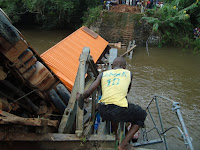

My small village Epulu has bridges over the rushing river of the same
name, which is a tributary to the mighty Congo. Epulu is in the
center of the massive Okapi Wildlife Reserve, and therefore is a
well-chosen and picturesque headquarters for park management and
conservation NGOs. Epulu's bridges grant marvelous views of the
surrounding primeval forest, glorious sunsets which disappear towards
scads of unknown, more westerly villages. They are also a good
lookout point for harbingers of distant lightning and nastily grey
clouds, which forebode incoming thunderstorms.
Furthermore, the bridges enable daily foot traffic between Epulu
village "centre" and my side of the river where most people have their
gardens. Ladies traverse while carrying huge loads of charcoal home
from the forest, uniformed school kids (white shirts, blue shorts and
flip flops) amble on their way to school, pygmies port large bundles
of fresh leaves on their heads to bring the okapis their choice of 30
types of fresh leaves everyday.
In addition to local traffic, the bridge is a national road between
the cities of Kisangani and Bunia, which was improved a few years ago.
It is one of the rare good roads in DRC, which is famous for its
neglected infrastructure which was both symptom and cause of the
severe under-development, among other things. Roads either
disappeared into narrow footpaths, or were maintained in a "artisanal"
manner in which people dug when stuck, in some cases gorges that are
10+ feet deep. However, this road is continually maintained (thanks
to World Bank & Chinese funding, not the government), which
facilitates lots of traffic.
Cattle move to market hundres of kilometers away, huge beer trucks,
trucks with migrants sitting on top, trucks that are nearly as tall as
they are long, coach buses, and all manners of transport use the route
and therefore these bridges. Since 2007, due to a fallen bridge over
the Ituri River, this national road has been a bit handicapped. An
overloaded truck brought down a 200 meter bridge and limited traffic.
Only since the beginning of October, was this bridge finally repaired,
which has opened up long-distance travel across the massive Orientale
Province.
Now we are a bit deranged...there is a massive 60-ton double truck in
the Epulu River with the bridge crumpled underneath it. No one was
injured or killed, but the truck was more than 2x the legal limit,
carrying timber east towards Uganda. Vehicles, fields, ladies, are
all on the opposite side from where they might need to be every day.
And road traffic on our national road cannot continue.
Fortunately, there are two pirogues in Epulu. I'm sure that the needs
to make daily crossings or long haul transport, may bring another wave
of Congolese resourcefulness. But the bridge fall will likely bring
forth a frustratingly opaque demonstration of malfunctioning
governance and public service sectors. As we wait for someone to fix
the bridge, rumors will float, passage methods will develop and the
river banks may be damaged and Epulu will function differently. The
mamas will slide down the river slopes to mount the pirogue, while
schoolchildren wait on the other side (or just stay home), and a young
male piroguiere will demand money from the both for their passage.
I just hope nothing like what happened at the Ituri River banks
happens here. More than two years without a bridge turned both banks
into huge market places, full of hundreds of porters moving timber,
beer, and cheap Asian electronics and goods, as well as trucks and
buses onto man-powered "hand over hand" rope ferries. As Conrad, or
maybe it was me, once said, "the chaos...the chaos....". We had to
cross with our vehicles every few weeks and pay $50 and wait 1-2 hours
for the privilege. But there aren't going to be ANY vehicles crossing
here.
The advantage is our bridge is less than 40 meters long and we're
located in a protected area, and both banks are occupied by
international conservation NGOs, which might help to protect the
surrounding area. The disadvantage is that this is Congo, where
outsiders fear to invest or work, and where civil servants are rarely
called so due to merit. This chaos always presents opportunities to
pad the pocket of a mal-trained, ill-paid, or fat individuals. I
can't make any bets about what will happen with the bridge, so stay
tuned....
No comments:
Post a Comment